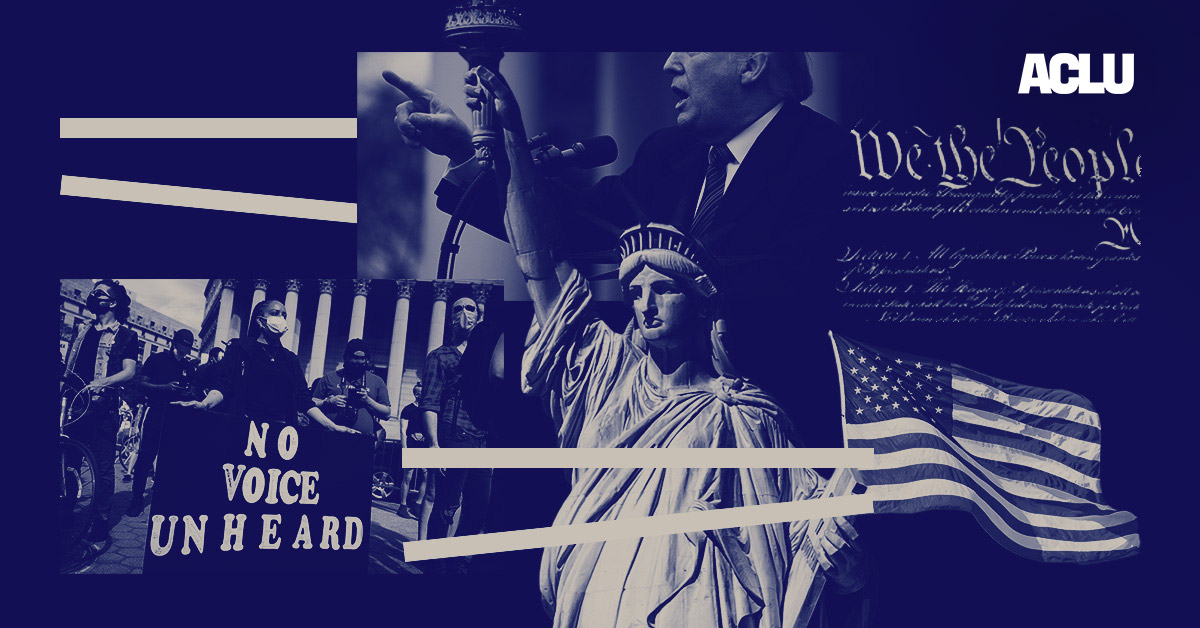Deeply embedded in our Bill of Rights and our most basic American values is the idea that we the people — not the government — are in charge of our own lives. But there are plenty of people who disagree with that premise and want to control our lives. And those people have a plan.
All of us remember Donald Trump’s presidency: separating families, banning visitors from Muslim countries, stacking the Supreme Court with justices who would overturn Roe v. Wade, and attacking LGBTQ people. Yet as the ACLU’s detailed analysis of Trump and his supporters' policy proposals and rhetoric has shown, if reelected, his administration will likely be far more aggressive and effective in executing its unlawful plans than ever before.
Under a second Trump administration, our federal government could be used to openly discriminate against marginalized communities, to spy on private citizens, and be given authority over what we can and can’t do with our bodies. If such a dystopian view of American life and politics feels like the plot of a Netflix special, consider that this vision of America is what former Trump administration staffers and The Heritage Foundation, a conservative-leaning think tank, have outlined in Project 2025.
Project 2025 is a federal policy agenda and a blueprint for a radical restructuring of the executive branch that would undercut decades of progress and Constitutional values. Though Trump has claimed he is not connected to Project 2025, a CNN report found that 140 people who worked on Project 2025 previously worked in Trump’s administration. The Heritage Foundation President Kevin Roberts also worked on Trump’s 2016 transition team and has described his organization’s role in Project 2025 as “institutionalizing Trumpism.” Trump himself told a conference, after taking a flight with Roberts, “they’re going to lay the groundwork and detail plans for exactly what our movement will do.”
While the ACLU doesn’t endorse or oppose candidates for elected office, we recognize how Project 2025 would erode our freedoms and our democracy. Project 2025's largest publication, “Mandate For Leadership,” includes a long list of extreme policy recommendations that empower Congress and the executive branch to hack away at our civil liberties and civil rights.
At the ACLU we’ve been fighting unlawful attempts to curtail our rights for more than 100 years. We’re prepared to use all of the tools at our disposal — litigation, legislation, advocacy, and grassroots mobilization — to ensure our nation lives up to the promise of the Constitution. But this fight isn’t just about policies or procedures — it’s about people.
Life Under Project 2025
Take, for example, an undocumented father living in Texas whose spouse and young children are U.S. citizens. The undocumented father is injured in a workplace accident, but in Project 2025’s America, he will have to choose between forgoing treatment or risk being separated from his family.
Currently, policy dictates that immigration agents avoid arresting or detaining suspected noncitizens in “protected areas” like schools, churches, and hospitals. But Project 2025 calls to weaponize these crucial common spaces as part of a broader anti-immigrant agenda that includes co-opting state and local police to help carry out a mass deportation plan. Nobody should have to choose between the pain of an untreated injury and the agony of being torn away from their children, but Project 2025 is designed to create exactly those kinds of impossible decisions for millions of immigrants and mixed-status families.
This example is hypothetical, but the risk is not. We’ve already seen how damaging family separation can be for children and parents, we know that immigration detention has a deadly track record of abuse and medical neglect, and we have heard time and again how devastating deportation can be across generations.
When the government decides how we are permitted to live, people and communities suffer. Imagine a 27-year-old woman in eastern Washington State who has a young son and becomes pregnant. She works two jobs, but struggles to make ends meet. She knows that having another child would be detrimental to her and her son and wants to end her pregnancy. But she lives several hours from the nearest abortion provider. She doesn’t have a car and she risks losing her job if she takes time off to travel to the clinic. Today, she would be able to do what 20 percent of people seeking abortions do and use telehealth to contact a provider and have FDA-approved abortion pills sent to her.
However, Project 2025 calls for a presidential administration to push the post-Dobbs epidemic of abortion bans into blue states like Washington. The Project has called for the misuse of a 150-year-old anti-obscenity law to prosecute health care providers for mailing abortion pills. If Project 2025 succeeds, that means the pregnant woman in Washington State won’t be able to get an abortion and will be forced to carry her pregnancy against her will and endure labor, possibly putting her own health and the wellbeing of her family at risk.
Scenarios like what the pregnant woman in Washington State may face prove that if freedom means anything, it should mean that we alone control our most intimate decisions. That includes how we present ourselves to the world.
Consider an Iraq war veteran who, like many veterans, receives medical care from a Veterans Affairs (VA) hospital. The veteran does not have other medical insurance, or the resources to pay for medical care out of pocket. She is transgender and has been receiving gender-affirming hormone therapy for more than a decade. Prior to beginning hormone therapy, she experienced significant gender dysphoria, which impacted her mental health and ability to function. She depends on gender-affirming care from the VA to keep her body aligned with her identity so she can maintain her health and well-being.
For the trans veteran, Project 2025 would be devastating. Following Project 2025’s playbook, the VA would prohibit the provision of gender-affirming medical care in the VA healthcare system. As a result, she is now forced to discontinue her treatment and medically detransition. She ends up struggling with the serious health impacts of untreated gender dysphoria, forcing her to take medical leave from her job and causing her to retreat from the military community she had built her life around.
The effects of Project 2025, however, won’t just undercut a single community or person, it will ensure that an entire generation lacks the resources to make informed decisions.
Imagine a high school English teacher in an under-resourced public school that is 65 percent Black. He knows from personal experience that not seeing himself reflected in the books he read and the history he learned made it hard to stay engaged and motivated in school. He remembers the “aha moment” when he took his first African American literature class in college and realized what it’s like to see his experiences represented on the page. That’s why he built an English curriculum that includes books by Black and brown authors, discusses current events that impact racial justice, and encourages students to write freely about their own identities. He’s found that allowing students to feel seen in what they study and in the work they do not only boosts engagement, but also test scores and graduation rates.
"Preventing Project 2025’s dystopian view of America relies on all of us to stand up for what we believe in and protect each other."
Project 2025 wants to gut the teacher’s entire curriculum. Already a wave of classroom censorship and anti-diversity, equity and inclusion (DEI) laws have severely restricted students’ right to learn. Project 2025 vows to take it a step further and eliminate all efforts to acknowledge or support diversity in schools. In Project 2025’s America, states are empowered to pass laws that force the English teacher to educate students on the benefits of slavery, or to remove all mentions of race when discussing civil rights icons like Rosa Parks. If Project 2025 succeeds, the teacher can no longer lead discussions about race in policing or in hate crimes without the risk of being fired for engaging in so-called anti-white racism. Unwilling to turn his back on his students, our teacher tests the limits, and quickly finds himself on administrative leave.
As each of these examples show, Project 2025’s nightmarish vision of America should alarm anyone who cares not just about the principles of constitutional freedoms and rights, but about people. The ACLU won’t stand idly by and let our fundamental freedoms — including our right to say what we want, to control our bodies, and to participate freely in society — be taken from us.
No matter who is elected president in November, the ACLU’s legal and advocacy experts have a roadmap to preserve and expand the rights of immigrant and LGBTQ communities, to advocate for abortion access, to pass nondiscrimination laws, and to fight for our rights. We’re prepared to urge Congress to use its constitutional powers to provide oversight, investigate wrongdoing, and defund restrictive executive branch policies. At the state level, we’ll work with lawmakers to enact laws that protect people from government abuse. Already, we’re in communities working to educate people on the harms of Project 2025 so we can fight for our freedoms.
But we can’t win this fight alone. Preventing Project 2025’s dystopian view of America relies on all of us to stand up for what we believe in and protect each other. Whether it’s our trans veteran who only wants to live as her true self, or our pregnant woman making the most intimate decisions about her life, or our high school teacher trying to empower the next generation, or our immigrant family that only wants to feel safe, we must all show up to support each other and our rights.
At the ACLU, we’re with you — in Congress, in the courts, in the streets — as we work together to build the more free and more just country we deserve.
We want to know how Project 2025 will affect you. Share your story with us.
Published August 29, 2024 at 10:27PM
via ACLU https://ift.tt/LWIN29w


No comments:
Post a Comment